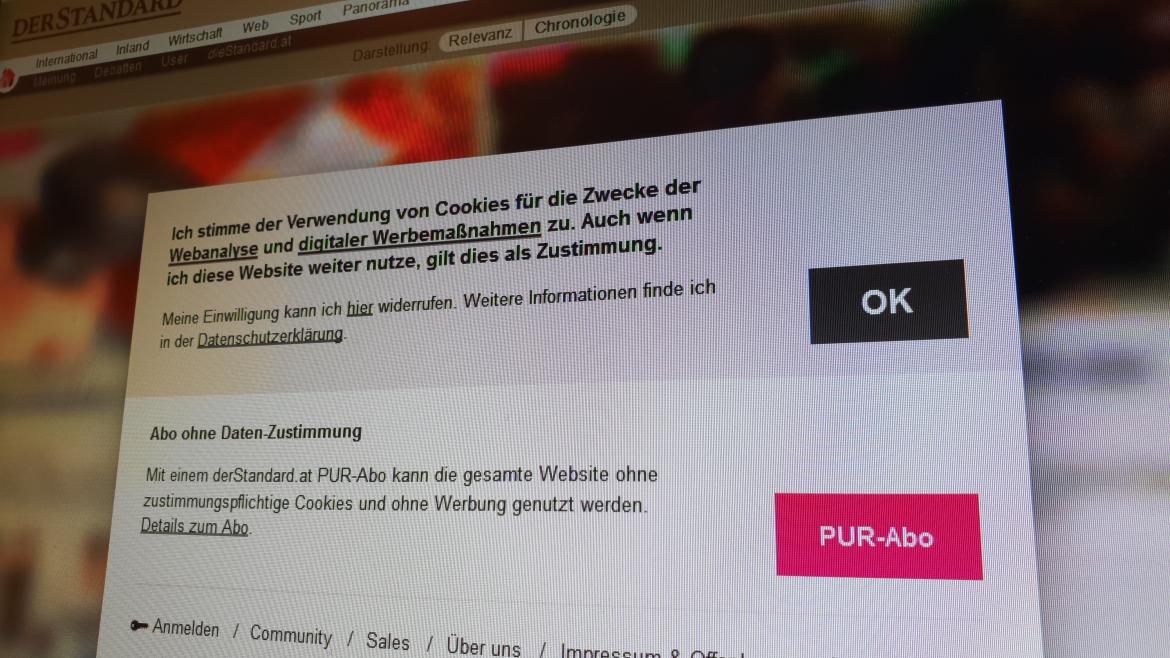
Guest commentary by Max Schrems in ‘Der Standard’ (an Austrian newspaper) to the subscription type ‘PUR-Abo’ by DerStandard.at
‘Would you like to have a bit more privacy? – Then you have to pay € 6 per month’
From Vienna to Berlin to Brussels, many experts and lawyers responded with disbelief to a decision of the Data Protection Authority (DSB) this week. ‘,Pay, or give up basic rights’ is not exactly what the new GDPR meant by ‘voluntary’ consent. As it is “Der Standard” that is acting that way is hurting me in particular.’
Voluntary consent?
What happened? With the introduction of the GDPR, users should receive a voluntary choice of ‘yes or no’ for data processing. After all, consent is nothing more than the voluntary abandonment of the fundamental right to privacy.
It is difficult for the industry as cookie banners on hundreds of websites are showing every day. There you often just have the option of clicking on ‘yes’. Instead of ‘yes or no’, ‘Der Standard’ offers a (quite creative) ‘yes or € 6’ option. One user filed a complaint with the supervisory authority (‘DSB’).
Advertising ≠ Targeting ≠ Data Sharing
On the website of ‘Der Standard’ you only get privacy ‘in the package’ with advertising freedom. This is neither technically nor economically necessary: advertising, targeting and personalization are different things – even if the lobby likes to sell it as a package.
Advertising is the same (eg in print) for everyone. If personalization was absolutely necessary, ad-supported TV would be gone already. ‘Der Standard’ also offers companies to advertise untargeted online.
Even targeting has many privacy-friendly varieties – such as geography, time or context (car advertising on the auto page).
Personalized advertising (often by sharing data with hundreds of external targeting companies) is just one sub-category of targeting, which further reduces waste coverage and increases profits. Given the extreme inflation of advertising prices, even that is questionable (‘Race to the Bottom’).
It is exactly this segregation which the DSB failed to pursue with its decision – it equates advertising and data transfer and comes to the conclusion that ad-supported models always require some sort of data transfer.
Economic side
Within a naïve assessment of the situation, ‘Der Standard’ has to get in about 30 to 90 cents per online user per month. Thus, the newspaper is charging 6 to 20 times more money for the ad-free version. Consequently, the refusal of the consent is extremely expensive and even civil litigious (laesio enormis). The sum is even lower if one does not calculate the entire advertising, but only the increase in sales through personalization of advertising.
However, the DSB compares this online subscription type with the print subscription for € 47 – and therefore comes to the (absurd) conclusion that the user would benefit from a consent economically.
Alternatives?
The DSB ist further referring to the ‘voluntariness’ as people could use other media (‘take it or leave it’). In practice, this is illusory, as almost all online media platforms pass data to exactly the same companies (eg Google), people want to read exclusive stories and are changing media providers in times of Twitter and Facebook.
Media step into the breach for ‘Pay or Okay’?
Politicians, authorities and consumer advocates are reluctant to engage in media. It is also consensus that qualitative media must be better funded. However, the media could step into the breach for many questionable companies. If ‘pay or okay’ prevails, it applies to all.
Any company could introduce ‘data transfer or paying’. This ‘Would you like to have a bit more privacy? – Then it will be € 6 per month’ could be possible from the mobile phone contract to the train ticket. Consequently, people who just have not won the lottery, will probably give their basic rights away “voluntarily” all the time.
The level of juridiction will have to decide
Since this is a fundamental issue of data protection, our association (noyb.eu) therefore plans to have this question clarified with the full facts of the DSB again. Because with all understanding for the financing of qualitative media and my loyalty to ‘Der Standard’: One should not boost the economic situation with forced data transfer.
Link to the comment on derStandard.at (for reasons of space slightly shortened and only in German)



